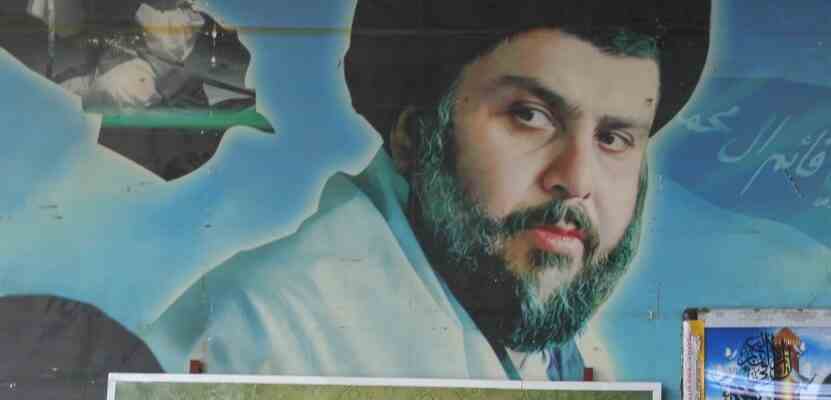The session of the Iraqi parliament should be a historic moment. 269 of the 329 elected parliamentarians met in Baghdad last week to prevent the country from sliding into civil war. Stoically, they went through the agenda point by point and, on the fourth try, elected the Kurd Abdul Latif Raschid as president. The ceremonial office traditionally belongs to a representative of the ethnic minority living in the north. Abdul Latif narrowly defeated incumbent Barham Salhi.
Newly elected Iraqi President Abdul Latif Rashid at his inauguration in Baghdad.
(Photo: Ahmad Al-Rubaye/AFP)
The real sensation of the day was that the vote in the heavily secured parliament was postponed, but then proceeded without interruption. Because around the building in the “Green Zone” protected by walls, at least nine rockets hit. Five people were injured. So far, no one has claimed responsibility for the attack, but it is clear who consistently rejects the presidential election. The heavily guarded government and diplomatic district has been stormed several times in recent months by supporters of the Shiite cleric Muqtada al-Sadr. Although his movement shares the Shiite faith with neighboring Iran, it rejects the mullahs’ interference in Iraqi politics.
The winner of the election could not form a government
Al-Sadr’s party won the elections as the strongest force, but was unable to form a government due to opposition from several pro-Iranian parties. After al-Sadr was unable to use political means to impose his prime ministerial candidate, he withdrew from the public and resumed his original role as a religious scholar in the summer. His critics believe the move was intended to evade responsibility for his followers’ storming of the green zone shortly thereafter.
Despite many casualties among the security forces and demonstrators in the fighting around the parliament, al-Sadr’s opponents remained uncompromising. The so-called coordination framework, an alliance of pro-Iranian parties, has the majority of MPs behind it and nominated Mohamed Shia al-Sudani for the post of prime minister. The 52-year-old, while popular in Tehran, is opposed by Sadrists and most non-Shia Iranians.
Is Al Sadr waiting for a second chance through the weakness of others?
Observers suspect that al-Sadr is no longer relying on violence due to the nationwide protests in Iran, but is simply waiting until the pro-Iranian party alliance dissolves due to a lack of support from Tehran.
But so far there is no sign of this. The most important task of the Iraqi President is to appoint the head of government. A few minutes after his election, Abdul Latif Rashid commissioned the independent Mohamed al-Sudani to form a government. He now has a month to do so and promised the deputies, who were visibly upset by the rocket attacks, that he would only appoint ministers who would actually live up to their responsibilities.
Tasked with the difficult task of forming a government: non-party Mohamed al-Sudani.
(Photo: Iraqi Parliament/AFP)
But behind the scenes of the formal end of the crisis, there is a lot of rumbling. For the Iraqi national Sadrist movement, it is still unacceptable that Iranian parties are shaping the future of the country. Representatives of the Sunni and Kurdish minorities are officially staying out of the power struggle. They are critical of both the idiosyncratic al-Sadr and Tehran. However, the mullahs’ current cynical calculation of power reminds many Iraqis of the bloody Iraqi-Iranian war of the 1980s.
If al-Sudani is unable to form a government either, new elections are threatened
Should al-Sudani not obtain a parliamentary majority for his ministerial team, there is a risk that parliament will be dissolved and new elections will be held. Due to its increasing popularity, Al Sadr is likely to bet on it. But even without new elections, the mood could turn against Tehran. The pro-Iranian coordination network has 138 seats in parliament. Because al-Sadr’s 73 MPs are boycotting parliament, pro-Iranian militia leaders like Hasf al-Shaabi are now in charge there.
Saleh al-Iraqi, a confidant of al-Sadr, warned that no militia government would be joined. At the end of last year, tens of thousands of people took to the streets against the government, which was inactive despite the massive economic crisis, and were shot at with live ammunition by pro-Iranian militias. The massacre of unarmed people with dozens of dead cost the pro-Iranian lobbyists in Iraq a lot of sympathy. “Anyone who joins the work in the ministries does not represent the Iraqis, but these militias,” al-Iraqi warned.
But the Iranian regime can circumvent Western sanctions via Iraq and will not give up its ambitions there without massive resistance from its militias. The future government will decide how to use more than $87 billion that has flown into the coffers of the central bank in Baghdad this year alone from the sale of Iraqi oil and gas.

